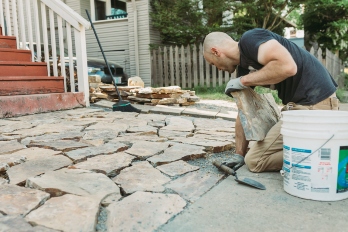How old is your home’s heating system? If you’re not sure, no worries. To figure it out, find the white manufacturer’s sticker on your unit that includes the model and serial number. You can then check with the manufacturer about the date your unit was built.
Why does age matter? According to a study conducted by the National Association of Home Builders and Bank of America, the average furnace lasts 15-20 years. Since the median age of U.S. homes was 39 years old in 2019, according to census data, there are quite a few heating systems out there that are getting into their twilight years.
Whether you’re currently shopping for a new system or want to be ready for when you need to be, there are a few important things to keep in mind. In this post, we’ll focus on:
- Your budget
- Your current HVAC setup
- Your annual heating needs
- Consulting multiple pros
Taking some time to consider these factors will help prepare you to make the best decision for your home.
Your budget
Think about the up-front costs of buying the unit and the long-term fuel and maintenance costs.
If you use your heating system often, it may make sense to pay more upfront to avoid high fuel costs later. On the other hand, a lower-cost unit may be plenty if you’ll only use it during the occasional cold snap.
Your home set up
What kind of heating system are you already set up for? Is there an existing oil or propane tank? Do you have access to city gas lines? Does your home have existing ductwork?
The most affordable option is often to replace an old system with a new one of the same type, but this isn’t necessarily the best choice. Switching to a more efficient system may involve additional installation costs, but it can make sense in the long run.
Your heating needs
Your area’s climate and your personal usage will also help determine which system to invest in.
If you live in a warm climate and only heat a few weeks a year, you may not want to invest in a propane tank. It may make more sense to just install an electric heater, even though electricity is a more expensive fuel when heavily relied on.
Conversely, if you use your heat system for 4-6 months out of the year, it may be more cost-effective to switch to a more efficient system.
Get a second opinion
It’s good to discuss your options with a professional. An HVAC expert can help you weigh the pros and cons of various heating systems, and guide you in selecting the best option for your home.
But before you commit to a choice, it’s wise to get a second opinion. Sometimes, vendors and contractors have preferences for certain kinds of systems, and they may try to push you in that direction. They may also try to upsell you with a more complicated system than you actually need.
Consulting multiple pros, and doing your own research, can help you make the best decision for your home. Our friends at Networx can help you find a few HVAC specialists in your area to get rolling.
Ready to turn to a pro for a free quote?
Together with Networx
Fill out the form below to get a quote from Networx’s vetted group of contractors. All your information will be passed along to Networx a third party.
For more information on home heating systems, tips for maintenance, and tricks to lower utility costs, check out these posts:
- A simple breakdown of home HVAC, plumbing, and electrical systems.
- Warm-up with our guide to wood stoves, space heaters, and other supplemental home heat sources.




